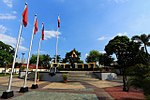Far Eastern University Diliman
FEU Diliman, formerly known as FEU FERN College, is an educational institution at Sampaguita Avenue, Mapayapa Village, Diliman, Quezon City, Philippines. Founded in 1994 to commemorate the birth centennial of Dr. Nicanor B. Reyes Sr., founder and first president of the Far Eastern University (FEU), the institution offers programs from Kindergarten, Basic Education, High School, up to Tertiary Education. FEU Diliman is the home of the FEU Baby Tamaraws, the high school varsity team of FEU, for the Juniors Division of the University Athletic Association of the Philippines (UAAP).Like its sister schools, FEU Tech and FEU Alabang, the college runs on a trimester academic system. An academic year starts in the second week of August and ends every June.
Excerpt from the Wikipedia article Far Eastern University Diliman (License: CC BY-SA 3.0, Authors).Far Eastern University Diliman
Wharton Street, Quezon City
Geographical coordinates (GPS) Address Nearby Places Show on map
Geographical coordinates (GPS)
| Latitude | Longitude |
|---|---|
| N 14.684444444444 ° | E 121.06333333333 ° |
Address
Far Eastern University
Wharton Street
1100 Quezon City (6th District)
Philippines
Open on Google Maps






